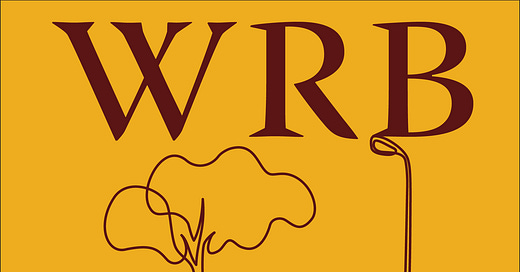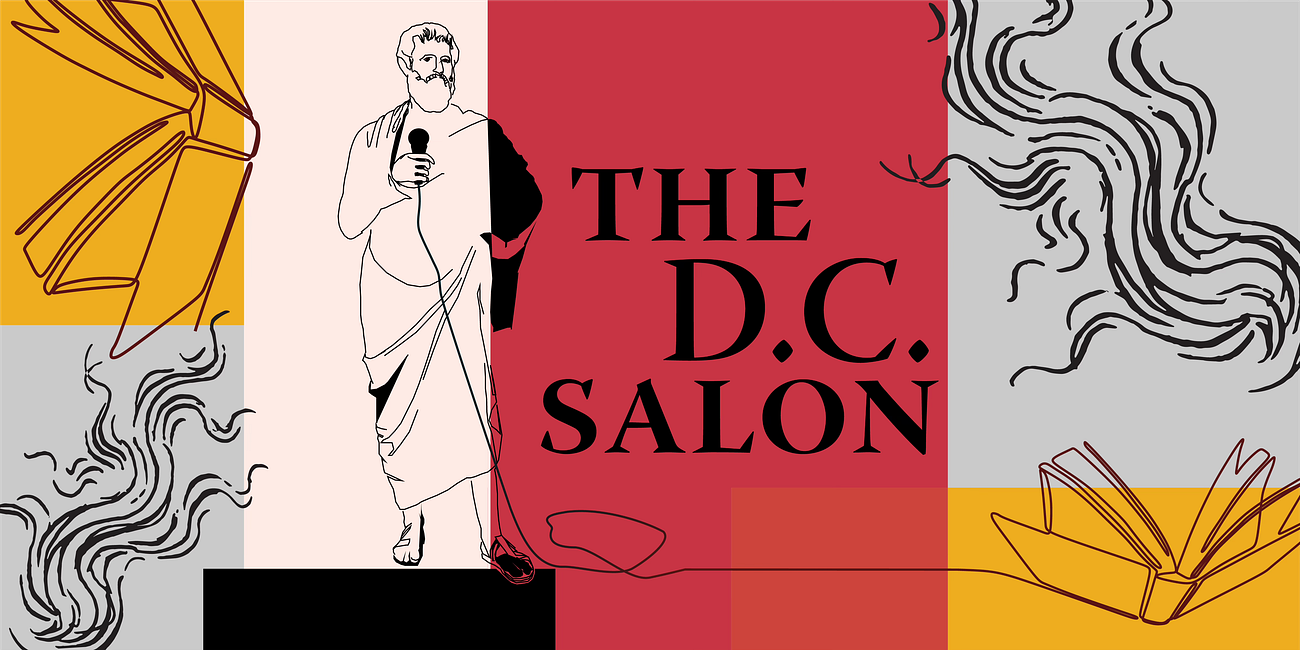“He would of been a good Managing Editor of the Washington Review of Books,” The Misfit said, “if it had been somebody there to shoot him every minute of his life.”
N.B.:
The D.C. Salon | July 2024
Each month Chris McCaffery—founder of the Washington Review of Books—and Celeste Marcus—managing editor of Liberties Journal of Culture and Politics—host a conversation with dozens of friends considering a question of pressing concern to us all. This is a community of kind, curious, and intelligent discourse. Join us!
You can now listen to the recording of the last session of The D.C. Salon. “Can nonbelievers pray?” is now available wherever podcasts are served:
Links:
In our sister publication on the Cuyahoga, Stephanie Burt reviews two recent collections of poetry (The Palace of Forty Pillars, by Armen Davoudian, March; out takes/glove box, by Maya Jewell Zeller, 2023):
Davoudian—by comparison, within his generation—stands almost alone: not alone in using old forms but alone in how well he uses them, in what he does with them, in how far back into history he seems to see. And that makes sense. People in 2024 who believe that old forms make poets politically conservative need to get out more. But people who see old forms—cooked forms, with time-tested recipes—as historically imbricated, as never brand-new, have a point: ballades and crowns or rings of sonnets and ghazals and rhymed quatrains come from, and point back to, previous eras, to what we call civilization. They work for poets who want to change that civilization, to adjust it, to live with it and within it (as, to be honest, I do too). If you want to try to live on the outside—in a figurative outdoors, in recovered innocence, in a wild state, out on a climbed limb—you may have no choice but to figure out how to stay raw, how to make poems that feel, not polished and wise, but wildly naive and new.
[ Moul had a nice piece on the English ghazal a few days ago; really, what I wish is that Swinburne had discovered them. No one was ever better at finding rhymes upon rhymes and making forms with no business working in English work, and the constraints on length would have checked his worst tendencies. —Steve]
In Engelsberg Ideas, William Fear on the philosophy of P. G. Wodehouse:
One of many writers to spring to Wodehouse’s defense was George Orwell. “The events of 1941 do not convict Wodehouse of anything worse than stupidity,” wrote Orwell. “The really interesting question is how and why he could be so stupid.” I believe it’s possible this unfortunate affair in Wodehouse’s life could be an example of Wodehouse becoming a victim of his own ideas. If one’s philosophy, pace Wodehouse, amounts to “saying ‘All right’ and going to sleep in an armchair” it’s much easier to be led astray by those with malevolent political intentions. Stoicism and optimism can be isolating philosophies. In the extreme, they can lead a person to become naive, and ideologically defenseless.
It’d be obtuse to argue that P. G. Wodehouse should be remembered as a philosopher. He’d have no doubt thought that preposterous. But his reputation as a master of the English comic novel—though apt—obscures the brilliance of his writing. It should be remembered that although his books were comical, they were far from frivolous. They contain a resilient optimism that will comfort, cheer and entertain readers for generations. While watching a documentary on Wodehouse, I was struck by a comment left by a reader: “God bless ole Plum. He got me through the death of my father, the death of my mother, and some of the hardest times I’ve ever faced.”
In Post45, Stephanie Anderson on women at small mid-century publishers:
In addition to the simultaneously inclusive and exclusive gesture of publishing friends, they also published their own writing, connected to espionage in that self-publishing is sometimes disparaged as a way of “sneaking” into a publication or book catalog. Throughout this essay I have been referring to much of the publishing activity I have described as “self-publishing,” and with good reason; many of the interviewees published their own work to be in conversation with that of other writers they admired. Aldan published herself not only as a contributor to Folder and A New Folder (1959) but also as the author and translator of individual volumes with Folder Editions. Waldrop describes how Burning Deck’s first letterpress chapbooks, published in 1967, were by herself and Keith Waldrop. Many of the editors of magazines especially included their own work. Myles says, “I put in my own best work and also work by people I wanted to be in conversation with. Including my own best poem made me more excited about distributing dodgems widely, me to be in such great company.” Aldan's understanding of her own group is visualized in the author and artist photographs at the end of A New Folder, where her picture—smiling, gazing up out of the book — tops a hexagon of young poets. Regardless of her role as an editor, she always also saw herself as a writer and translator, and she published her poems or translations in every issue of Folder and in A New Folder. In revisions to a 1993 pamphlet for Folder Editions, which lists titles written or translated by Aldan available from other presses, she crosses out “editor” under her name to shift the emphasis to her role as writer and translator.
[Behind the paywall: Julia recommends a novel to get straight men to read, Steve on “the Catholic Imagination,” the politics of the modernists, and Sir John Franklin’s expeditions, E. E. Cummings, gardening, Balzac, Strabo, autofiction, and more links, reviews, news items, and commentary carefully selected for you, just like on Saturdays. If you like what you see, why not sign up for a paid subscription? The WRB is for you, and your support helps keep us going.]
Keep reading with a 7-day free trial
Subscribe to Washington Review of Books to keep reading this post and get 7 days of free access to the full post archives.








